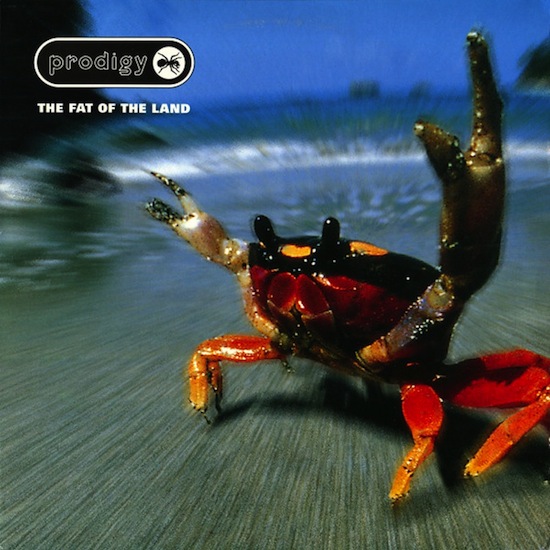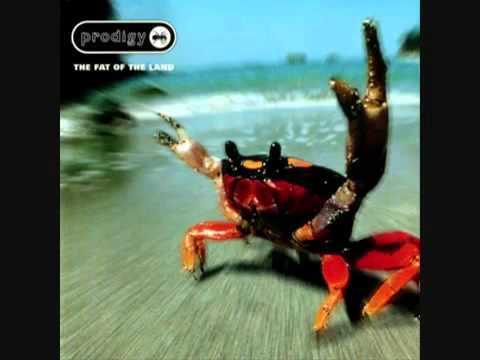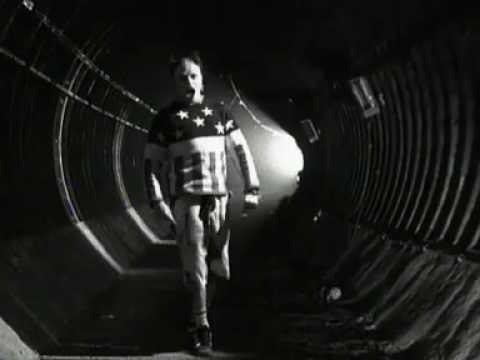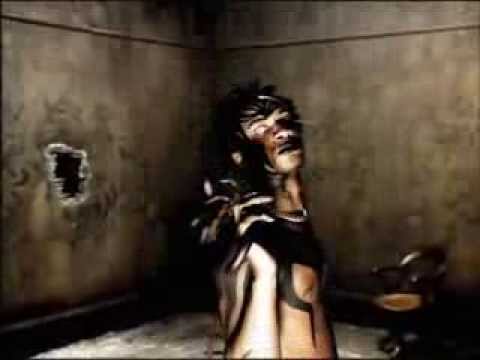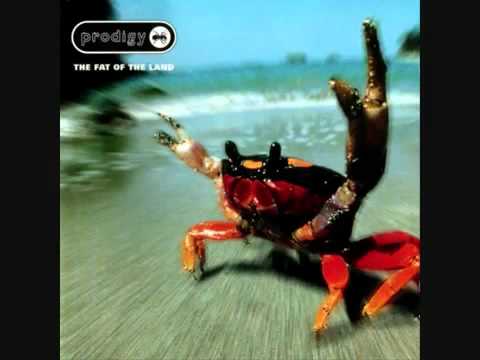History tells us that 1997 was the year Britpop went mainstream: when Noel got invited to Downing Street and all things "alternative" completed a ram-raid of popular culture. Yet the biggest British album of the year – the one that truly captured the world’s attention, as well as dominating the summer’s charts, if not quite topping the year-end sales figures – wasn’t released by bullish northerners or enigmatic experimenters, but a four-piece from perennially unfashionable Essex who didn’t look, think or behave like a "proper" band, who viewed appearing on Top Of The Pops as selling out never mind accepting an invitation to No 10, and who didn’t operate on the margins so much as between the cracks of a music world that preferred it when artists fitted neatly into rigid and pre-defined categories.
It’s little wonder The Prodigy’s dominance of the middle of 1997 has largely been airbrushed from the records. They’re the one truly anti-establishment b(r)and to find wide favour in that era of wholesale co-optation of left-field music, whose deliberate attempts to shun broad acceptance backfired spectacularly and made them genuinely and extensively popular. Their entire career has been, in essence, one long big two-finger gesture – like the one being made by the crab on the last-minute-decision album sleeve – aimed at whoever is satisfied by mediocrity and consensus, every move taken as much because of who it’ll piss off (and how much) as because it’s the right thing for the group to do in and of itself.
Pretty much everything about The Prodigy was wrong, at least as far as certain elements of pop’s chattering classes were concerned back then. They weren’t even a proper band, really – only Liam Howlett played any actual instruments, and most of the time he preferred messing around with samples, that currency so debased in the eyes of a certain kind of puritan that it barely qualifies as "real" music. Prior to The Fat Of The Land, with the exception of one track (Maxim Reality supplied vocals on ‘Poison’), three quarters of the line-up did nothing on the records, and even after its release, one member was "just a dancer" – hellfire, at least Bez played the maracas. They’d made their name in a despised subgenre that the music press didn’t ever really manage to get to grips with properly, and their first hit spawned an even more hated offshoot trend for unimaginative techno records that sampled from kids’ TV. (Not something they could possibly be blamed for, of course, but it became part of the case for the prosecution nonetheless.)
And then there was their greatest sin of all: to have nothing definite and important to say. After hip hop had reignited the flames set burning by punk, and shown how vital and engaged it was possible for popular music to be in the wider, bigger discussions of the day, here was a group appropriating not just rap’s mantle of anti-establishment aggression but claiming as their birthright the angry energies of the late 1970s. And the nearest their music had gotten to a political statement was what their detractors thought of as the gauche oversimplifications of "Fuck ’em and their law."
Nevertheless, so vital and urgent and compelling and – well, let’s face it – downright popular had the second Prodigy album, Music For The Jilted Generation, proved to be, that even the sniffier sections of the music media had little choice but to treat ‘Their Law’ as the fig leaf of respectability that allowed them to get behind the band. And so, as the hits kept on coming and appearances at Glastonbury and other major festivals helped cement the group’s position as one of the biggest and most powerful new forces in British music, the media were broadly onside. They may not have understood the music, and they may not have felt that this were really "their" kind of band, but it was clear that The Prodigy were sufficiently big enough a deal for it to look decidedly odd not to roll out whatever colour of carpet was used to welcome cover stars.
And so, by the time the band got around to releasing a follow-up to Jilted Generation, The Prodigy were in a unique position. The build-up had begun over a year earlier, when ‘Firestarter’ gave them their first UK Number One hit. After ‘Breathe’ followed it to the top of the charts in November of 1996, it was clear these upstart outsiders with their mutant music were now a force to be reckoned with. Both Keith Flint and Maxim Reality were not just contributing vocal performances to records bristling with punk’s aggression, rave’s communality and hip hop’s reliance on the biggest of beats, but writing them, too – and these were no longer cult releases: they were properly huge hits. At no point could The Prodigy ever have been justifiably accused of playing the game. They still hadn’t even done Top Of The Pops.
The lead-up to The Fat Of The Land‘s release came with some of the trappings of stereotypical rock excess, given a typically cussed Prodigy twist of studied disinterest. There was a media launch event for the record, held at a secret location in southern England – which turned out to be a farm, where the album was played over a massive sound system set up in a barn, and a prize Hereford bull was paraded around, wearing a flag bearing the band’s logo (an ant – the supremely strong, perennially underestimated, ubiquitous irritant). Bottles of Becks, with the logo and the album title replacing the usual label, were dished out to complete the illegal-rave-circa-1995 vibe. The band were nowhere to be seen. "They basically listened to demos," Liam told me a few weeks later. "I was recording the vocals to ‘Serial Thrilla’ that day. Keith was going down there with Leeroy, but I phoned him up in the morning and said, ‘Look, I need you in the studio today.’ And he said, ‘Oh, cool,’ ‘cos he didn’t really want to go anyway. And then Leeroy didn’t go either."
The record, as has tended to be the case with quite a few of the six Prodigy studio albums released to date, was something of a transitional affair – at least in terms of how it was made. Howlett was working for the first time with software as well as hardware, using the Cubase audio package to mix and sequence tracks that were built around looped samples then augmented with elements he either played or recorded. By the time of the next Prodigy album – 2004’s Always Outnumbered, Never Outgunned – he’d moved over to software almost entirely: up to the final mixes, pretty much the whole thing was put together on a Mac laptop using the software package Reason. Vocals would likely have remained the blend of guests and samples that had dominated Jilted Generation, had it not been for the emergence of Keith and Maxim as not just visual focal points and rave-style MCs during gigs, but as viable front men of audibly singular personalities in the vocal booth. It was likely a given from the outset that Maxim would appear on a track or two, but Keith’s transmogrification into the character that fronted ‘Firestarter’ – and apparently traumatised a nation after the video first aired on British TV in 1996 – seems to have taken everyone by surprise.
"With ‘Firestarter’, that was an instrumental record, the first instrumental for the album, and I played it to Keith to see what he reckoned," Liam recalled. "He said, ‘Yeah, I’d like to put some lyrics on it’. And I laughed. I said, ‘Are you serious?’ And he was, ‘Yeah! Absolutely!’ So I just thought, yeah, let’s try it. At that time I wasn’t thinking, ‘I’ve got an album to write, I need to get onto the next track’ or anything. And when we did it, it was convincing, and it works. It’s so simple but it fuckin’ works. That’s something that Keith’s got that not many other people’s got – Keith’s so simple with his delivery and with his lyrics it’s almost too simple. But it’s got a punk rush, a crude feel about it. His performance gets that across spot on. I’m not saying people want to be like Keith, but they want to be simple and straightforward: but lyrics confuse things and complicate things too much. But Keith’s no singer, and he’s not trying to be, that’s Keith. That’s why he’s good at what he does."
"It’s where I want to be and what I want to be doing, you know?" Flint told me during the same set of separate interviews – which took place on a flight between Germany and Canada in May 1997, after the album was finished but before it was released, with the band en route to a US tour that would help them land the Number One spot there for the LP. (Unless otherwise noted, all quotes in this article are from these interviews.) "I’ve spent five years expressing myself with my body, trying to make my body go ‘Wooooaaaggghh!!!’. Now I can do it vocally, and that is fantastic. I wouldn’t say it’s because I’ve got words or emotions inside me I want to let out, it’s just that I can shout at people as well as abuse ’em with spit and other things! Liam being such a perfectionist, knowing that nothing goes on his tunes that he doesn’t like or he isn’t sure about – for him to just suddenly chuck this guy that doesn’t do vocals, who cannot sing, onto his tracks, you know, it’s a kind of honour, and an extremely cool buzz."
"Keith operates on two levels," Liam said. "One level is an extremely intelligent level. You can listen to the lyrics on ‘Firestarter’ and in some ways they’re very deep, but on another level they’re so simple. One of the things that made me laugh with ‘Serial Thrilla’ was when he said to me, ‘I wanna be on that stage, and I wanna be singing "Taste me!", and I want the people to look at this dripping fucking mess on the stage, and be thinking, "What the fuck?"’. That attitude appeals to me more than someone going, ‘I’ve got this idea for some lyrics, they’re sooooo deep’. I don’t wanna hear that shit. But I know in the back of his head he’s operating subliminally on that level as well. That’s Keith, that’s what he’s like. On one level he’s really mellow – he’s a puffhead, he smokes too much weed. I keep telling him he smokes too much fucking weed. And on the other level he’s the most extreme person I know, and that’s what makes him interesting. He’s full on. Sometimes he’s… he’s not too much, ‘cos he’s my best friend. But I like the way he operates, I can really relate to him."
"The lyrics aren’t deep or meaningful, it’s just about getting something where the syllables sound aggressive enough and they follow the pattern of the tune," Flint said. "I think it’s more important to sing about a washing machine if it sounds right and you get it across aggressive enough, than ‘I’m so deeply hurt’ and paint this very poetic picture of your innermost emotions. But on ‘Firestarter’ there are a couple of lyrics in there that I slipped in that fitted well and really mean something to me, though the actual lyrics are very basic. But to me that means that there’s something behind it, and it means it’s so honest."
Despite a stage presence that takes bullish bravado to considerable heights, and the occasional glimpse in conversation of supreme self-confidence when compared to certain definable benchmarks, Flint is not someone who seems naturally inclined to eulogise his own abilities. An exchange about what difference recording ‘Firestarter’ made to him personally may come as a bit of a surprise to fans accustomed only to encountering him on stage or on record.
"When I first did ‘Firestarter’, I felt, ‘Fucking hell, Liam has made me like myself for the first time’," he told me. "For the first time I’d liked something I’d done. Not just musically, but personally. It’s hard to explain just in that one sentence, but from that moment on I loved Liam to bits even more. ‘Fuckin’ ‘ell, you can’t do that, you’ve cheated my own mind!’. That’s a very honest thing to say. I got home and I put it on, and I thought, ‘I fuckin’ like this’, and I felt this massive wave of emotion."
Did you cry?
"No!"
You did, didn’t you?
"There was a tear. The throat went taut. It made me highly emotional," he eventually admitted. "That was quite mental. An absolutely mental feeling. And that’s as honest as it gets."
"Did he talk about his dad?" Leeroy asked after I’d interviewed Keith. "His dad’s quite successful, and because Keith was a little mod, and then he was a biker, there was such a clash there. I imagine that his dad expected a bit more from him than he got. I would have fuckin’ hated to have gone to school with him. But now the band’s come along he’s finally realised he can do so much. Keith just needs a little push, and once he’s into something he won’t stop until he’s done it. He’s so much cleverer than he thinks he is. He’s taken a lot of pressure off of all of us, really. We can go through an airport at seven in the morning no problem for us three, but he gets all that, ‘Firestarter! Firestarter!’, signing autographs for ages while we sidle off. I just know him so well, and before the band I know what was going on in his head. It’s so real. People look at him and think, ‘Crazy guy, crazy hair’, but he has to walk around like that, live like that. He’s got more balls than I have. I couldn’t handle that."
Describing himself as "a bit like the band agony aunt," Thornhill offered quick sketches of the other personalities in the group.
"Liam, when we first got together, he was shy as fuck. It’s been funny watching him grow up. I know it sounds like I’m coming over as ‘the mature adult’, but he was 19, we were 21. At that sort of age two years makes a difference. And he was so shy it was funny. Nowadays he says what he means, and some people, especially myself, I can just sit back and say nothing about things ‘cos I’m chilled out, but he won’t ever let anything go that’s not right. Whatever the geezer’s got he deserves so much. He’s the best in the world at what he does and he’s never let it go to his head.
"Maxim’s never really changed for me. He’s pretty chilled out. If you’re in the van with us, it’ll be me and Keith with all the gob and the larking about, but the minute we go out and they get drunk, Liam and Maxim take over. I’d say out of all of us he’s the one that’s the least changed. He’s always been chilled out – it’s in his nature I think. He’s the one who gets out the most and does things. He’s got the most get up and go, but that’s probably because he’s from Peterborough which is a bigger town and he lived in London, whereas we come from a stonehead town that doesn’t move very fast."
By the time they made ‘Breathe’, and despite both Keith’s and Maxim’s relative inexperience at writing and recording vocals, the process had become intuitive.
"’Breathe’ was an instrumental track for ages, then I thought if we put some lyrics on it, it might make sense," Liam said. "I got it up in the studio again, said to Maxim and Keith: ‘Here’s where the lyrics should go’, went into the lounge to watch Neighbours or something, come back half an hour later and they’d finished the lyrics. I changed a couple of things – Keith’s verse, the rhythm of his lyrics: I like to give him a bit of guidance because I’m into the way emcees chop up lyrics, and I gave him a bit of guidance with that, and he got it right. And they did it in half an hour."
Just as ‘Firestarter’ had resulted from, in a sense, an accident – the try-it-and-see approach that hit gold – the overall shape, sound and themes of the record grew out of what the band felt they knew best, how they worked, what they felt and where they wanted to go. But there was also the need not just to confound expectations, but to actively challenge listeners – even of pushing the less committed among them away.
"I think people always expect what we did before," Liam said. "Because Jilted was such a big record people might expect to hear another ‘Start The Dance’ or another ‘Voodoo People’. Well, talking about ‘Start The Dance’, I’ll never write another record like that again, because I’m not into stuff like that any more. And if people aren’t with this record, then they won’t like The Prodigy any more. Because this is us, now – this is what’s happening with us, right now. For me, it captures what’s going on now, what’s been going on over the last ten years as well. There’s loads of different inspirations in the music. You can never tell if people are gonna receive a record. I like it, that’s what counts. I write for one person, that’s me. Secondly I write for three other guys in the band. And thirdly the rest of the world. I don’t care if people don’t like the record. I know it sounds like a stupid sort of thing to say, but I feel like I’ve achieved something myself, and no-one can break down that achievement. I’ve made a record that’s supposed to be the third ‘difficult’ record, but look at it! ‘Firestarter’ and ‘Breathe’ are already on there. I don’t need to prove anything anymore, so I’m just writing an album that I want to hear."
Despite this wilful single-mindedness – indeed, quite probably also because of it – the band had begun to appeal to ever greater numbers of people. This sat uncomfortably with Howlett in particular, who always saw the group as being confrontational and defiantly non-mainstream. That enough people were coming around to his way of thinking wasn’t really the point: numbering The Prodigy as among the biggest bands in Britain wasn’t ever part of the plan.
"People keep telling me these things, but they don’t really go into my head," he said. "I mean, Oasis are the biggest band in the country. The Spice Girls are one of the biggest bands in the country. The Prodigy are not, and we don’t want to be. We want to be a band that’s producing stuff that people don’t like. Let me explain it this way: I said to my dad, ‘Do you like Oasis?’, and he said he did. That’s number one wrong point for The Prodigy. It just won’t work with us. Everyone likes Oasis. I don’t want everyone to like the Prodigy. The Prodigy is too hard for some people: good. I want it to be like that. GOOD."
Howlett didn’t discuss it, but there were other aspects of becoming famous that probably helped explain some of his reticence. Even before Fat Of The Land went on to top charts in a reputed 23 countries, the level of attention the group were getting from fans was starting to get scary.
"I swear to God, man, just being round Liam’s house the last few months, I couldn’t live like that," Leeroy said. "It just don’t stop. The fax machine’s like someone’s unrolled toilet paper over the floor. Him and Keith both had little bits of hassle from fans outside their houses. And it can be strange when you’re just a normal bod and someone comes knocking on your door at one o’clock in the morning, saying, ‘Are you having trouble with Satan? You know, "Fire", "Firestarter"? Because if you’re having trouble with Satan, I can help you’. And there’s all this stuff on the internet – ‘Let’s take a trip to Braintree’, and there’s like pictures of his fucking house. And he had two German girls camped in the bed and breakfast at the end of his road. At nine in the morning they were sitting outside on the wall by his house, and they were still there at midnight. After a while they went off to go outside Keith’s house. They’d come from Germany, you have a little chat, give ’em a couple of T-shirts, but what else can you do?"
Just as strong as the need to not get too big was Howlett’s determination not to be railroaded by ‘Their Law’s positive reception. He would never allow his band to become the rave act with a message. The inchoate amalgams of slogans, moods and atmospheres that Maxim and Keith dealt in – "This is dangerous!"; "Breathe the pressure!"; "I’m the fear-addicted danger illustrated!"; "Taste me! Succumb to me!" – can easily be criticised as devoid of meaning, but at the same time they combine with Liam’s music and the group’s stage presence to make a consistent and cohesive sense fans had no difficulty understanding. They worked as a kind of series of shared cathartic howls, and together built up a sense of community and deeply set communication that would prove subtly but durably influential on mindsets and worldviews. Besides, Liam argued, the existence of the band was a political statement in itself.
"That’s all you need to say: you need to be in a band with two black guys and two white guys," he said. "Okay, I wrote ‘Their Law’, we put it on the album, it’s still a good tune and we play it live and it still goes down well, it kicks. But none of these tunes are like that. I’ve always said that politics and music don’t mix. If you’re talking politics through the lyrics, it doesn’t work for me. Public Enemy are one of my all-time favourite bands, but I liked them for the beats. I liked them on a kind of unintelligent level. I liked the rawness. Same again – Rage Against The Machine are one of my favourite bands, and Zak is saying some heavy, heavy shit. But I’m not really interested in that. I don’t want to know. I wanna know if his guitars are fuckin’ raw and if his voice sounds good. That’s what I think about good music – it can operate on two levels at the same time. It can operate on a totally fuckin’ dumb level which, to be honest, is the level most people understand. I think that’s what this record does. You can’t be too clever. If you operate on a level that’s totally intelligent you run the risk of not making an interesting record. I can’t think of any interesting records that don’t operate on two levels."
These strands were fused on Fat Of The Land in two tracks that ought to have succeeded in Howlett’s implied aim of causing all but the most committed Prodigy fans to head for the hills. First there was ‘Narayan’, a high point on an album bristling with them, but a collaboration with Crispian Mills of Kula Shaker: the son of big-screen star Hayley, Mills had given an interview to NME that was published in March of 1997 in which he talked about the swastika, noting it was a Hindu symbol that had been stolen by the Nazis. So far, so unnecessarily provocative – but when he went further, and said he’d like to perform in front of burning swastikas, "just for the fuck of it," the wave of outrage unleashed against him effectively torpedoed his band’s career. Shitstorms took longer to create in those pre-social-media days, but they also took a lot longer to disperse: by Fat Of The Land‘s June release, the piles of opprobrium being heaped on the Kula Shaker front man were big enough to spill over and cover anyone he’d ever worked with, Howlett being merely the latest and most prominent. Never mind that the track had probably already been recorded before the controversy arose (nor that doing something you knew would piss people off just because you enjoyed getting a rise out of them would have endeared Mills to the Prodigy even more) – the inclusion of the track on Fat Of The Land gave reason to those looking for it to take against the Prodigy record.
And then there was the album opener, and what became – still somewhat inexplicably – the album’s third single. ‘Smack My Bitch Up’ had been conceived as an opening song for the band’s live set and used a sample of Ultramagnetic MCs’ rapper Kool Keith from the 1987 single ‘Give the Drummer Some’, which Howlett had already mined to winning effect in the early single ‘Out Of Space’. ("I never even heard that," Kool Keith told me in 2003. "I used to see that on my royalty statements and think, ‘What is this record?’ For a good two years I didn’t know what it was.") The final version that appears on the album seems to use a newly recorded version of the lyric. Kool Keith appears on Fat Of The Land in his own right on the song ‘Diesel Power’, so it’s not unrealistic to imagine he could have laid down another take of a few lines from the earlier record specially for Howlett.
Liam could justifiably be accused of wilful blindness to the substantive objections. He knew the use of the word ‘bitch’ was asking for trouble at the best of times, and to then title the track with a phrase that could very easily be interpreted as advocating violence against women to add to the blatant disrespect already inherent given the language used was surely taking his predilection for needling people far further than could ever be necessary. He even used it as a gauge to judge the suitability of future business partners: when the band were being courted by US labels ahead of Fat Of The Land‘s release, the reaction of Freddie DeMann, head of Madonna’s Maverick imprint, to ‘Smack My Bitch Up’ helped seal the deal ("[DeMann] was like, ‘Fuck, you’ve gotta call that record ‘Smack My Bitch Up’, And I told him I was gonna call it that anyway. So from then I knew they had the right vibe.").
But the fact remains that, of all the lines Howlett could have chosen, he went for the ones guaranteed to cause the most offence. Kool Keith’s own justification for the original line was that "it was to represent rage," a sentiment Liam seems to have endorsed. And, regardless of whatever the rapper’s intentions had been when he’d written and recorded the line a decade earlier, by 1997 the possibility of using the word "bitch" in a gender-unspecific way did at least exist, giving Howlett a slim but still real defence against charges of misogyny. Most likely he was unable to resist the opportunity to simultaneously bait those he knew were itching for an excuse to take a pop at him and his band, while giving their fan base a controversy to rally around – to create a sense of PC persecution he could draw strength and power from. This helped ensure Fat Of The Land emerged only when the group had managed to fashion themselves a new position as underdog, even when the process of making it had begun with them as a dominant musical force. The pattern would be repeated thereafter, no Prodigy album since ever having been released until the band had managed to put themselves in a position they had to fight their way out of.
Certainly, if it was intended that the track would spark otherwise avoidable incident, it was an untrammelled success. It led to a public spat between The Prodigy and the Beastie Boys, who – oh, the irony – had approved the use of a sample from their 1994 single ‘Root Down’ for use in Fat Of The Land‘s ‘Funky Shit’. Ahead of both bands’ Reading Festival appearances in 1998, Mike D and MCA rang Howlett and asked that The Prodigy not play ‘Smack My Bitch Up’ during their set. Of course, they played it anyway, with Maxim referring disparagingly to the phone call in a spoken intro to the song, saying: "I do what the fuck I want."
"It’s basically the most pointless song I’ve ever written in my life, but it’s probably one of the most exciting," Liam said. "It starts with that sort of mono radio quality to it, Binatone sound – that’s the phrase we use when something sounds really weedy. And then the big bass comes in – that’s what we open the set with, so it had to go first on the album because the album is a soundtrack to the live show. I love the humour in the music. I mean, ‘Smack My Bitch Up’ – you can’t think I’m serious about writing a record about smacking women up. There’s humour involved in the tunes, it’s got to be like that."
All of which is a half-hearted justification at best, and The Prodigy emerged from the episode with little credit: but it was no surprise that they wouldn’t be talked out of any of it. That would have felt like compromise – the one thing Liam wouldn’t countenance, and probably the only thing his band mates would have ever stepped in to prevent him from doing. There would be rough times ahead – when the follow-up to Fat Of The Land was scrapped, the eventual Prodigy album that emerged featured neither Keith nor Maxim, and by that time Leeroy had left – but that stubborn insistence on never doing anything that others would instruct or advise them to do has remained an unbroken point of principle.
In a way, this may be the most prescient part of their legacy. That need to oppose the consensus, to keep on irritating and niggling the respectable middle ground, has become a defining character of our current age. In that Britpop summer of Labour landslide and a sense of relief from the creative industries that decades of Thatcherism had finally bitten the dust, The Prodigy remained off to one side. Today, after the populist ructions of 2016 and the use of the ballot box to give a bloody nose to whoever’s in charge, defiance, insolence and deliberate nonconformism are now mainstream traits. Every record The Prodigy made after Fat Of The Land has arrived only after one of the most consistently successful bands of the modern age has contrived to find themselves with something – often everything – to prove. Quite how they’ll be able to do that today – or even if they will try – is a question it will be fascinating to hear being answered.
Thanks to Martin James for his help with this article

